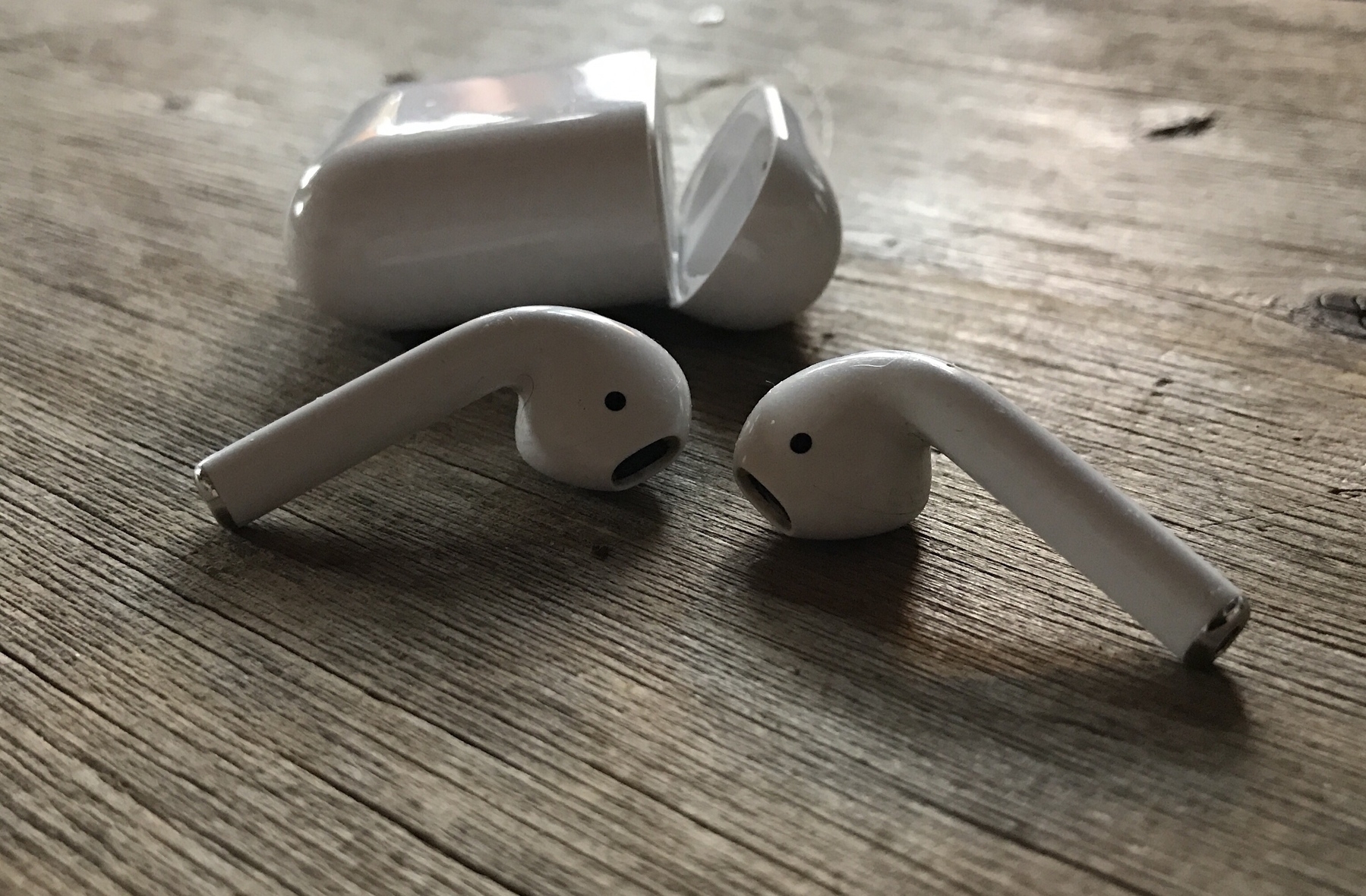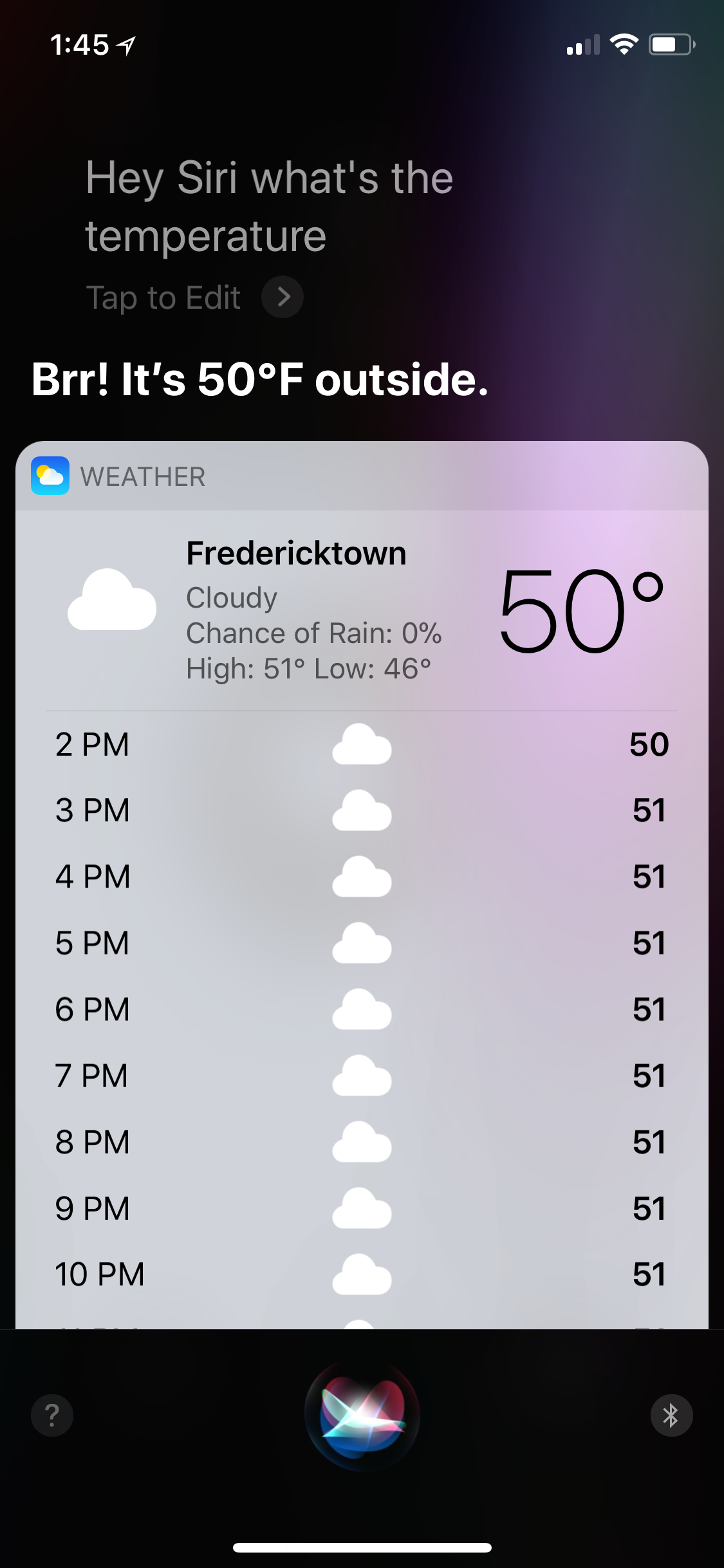Goldfinch!
[caption id=“attachment_1325” align=“aligncenter” width=“625”] American Goldfinch[/caption]
American Goldfinch[/caption]
I ordered the AirPods within minutes of them going on sale and have had a full year with them. I posted a few thoughts over at Beardy Guy Musings

One Year with Apple AirPods

It was a year ago that began selling the AirPods and they were sold out instantly. In fact, it was difficult to get them for months as Apple struggled to keep up with demand. Production finally caught in mid-summer up only to fall behind in recent weeks as holiday demand surged. I ordered mine within minutes of them going on sale so was lucky enough to get in on the first shipment. I’ve worn them many times a day every day since they arrived.
It’s been said by many over the past year that the AirPods were their favorite Apple product in recent memory. There’s no doubt, they are a delight to use. For anyone that enjoys music or podcasts on the go, especially those with an iPhone or Apple Watch, these are well worth the cost.
A few highlights:
- They stay in my ears very well and many report the same thing. Even if the fit is not perfect, because there is no wire tugging, they tend to stay put.
- The batteries last 3-4 hours and recharge very quickly in the case which lasts for 3-4 days.
- Siri works fantastically.
- Phone calls are great. The mic does a great job of cancelling out background noise providing clean audio for the person I’m talking to.
- With the occasional oddball exception, they pair up quickly with whatever device I’m trying to use. Usually iPhone or AppleWatch, sometimes an iPad.
- I’m often streaming music from my iPhone to the AppleTV. When I head out for a walk I pop the AirPods in and the music switches to them with no action from me. That’s the kind of magic that makes me smile.
- They rarely drop the connection and have a pretty fantastic range. I often step outside my tiny house, forgetting the phone inside (sometimes leaving it deliberately) and can take care of little tasks such as refilling bird feeders, watering plants on the deck, etc. A 30 foot range is pretty typical. At about 40 feet they start to drop a bit.
- I use them a lot with Siri to control audio especially in the winter when my phone is in a pocket, I’m wearing gloves and the watch is under layers of clothing. I often tap through hats and hoods to activate Siri and it works great to change artist, repeat a song, skip forward, etc. Same to answer or initiate a call.
- I have not lost them. They are in my ears or in the case. The case is on a shelf (they have their spot) or in my pocket. Basically I treat them the same way I treat other little things such as my keys.
Woke up thinking about creating, sharing, blogging, social media. I’ve been blogging since 2002. Had a podcast from 2004-2006. Previous to that I’d done pirate radio in Memphis. Arrested for it. Equipment confiscated. Did a couple community newspapers after that. Gears turning.
Over at Beardy Guy Musings, my Apple and tech oriented blog, I’ve written up a few thoughts on HomePod and the Siri Ecosystem.
I’ve only been on micro.blog for a week or so but something I’ve noticed is that it seems to be 99% white men. Hopefully now that it has opened up to everyone this will change. Looking forward to a more diverse community. Still, maybe says something about the the core community?
HomePod Pricing
 It’s always funny when journalists give advice to Apple. Here’s Shira Ovide at Bloomberg who suggest Apple’s HomePod is priced too high:
It’s always funny when journalists give advice to Apple. Here’s Shira Ovide at Bloomberg who suggest Apple’s HomePod is priced too high:
But if Apple truly wants to become more than a hardware company, it needs to think different -- to steal from a Steve Jobs advertising campaign. It needs the quality of its digital music service, mapping app, Siri, future web video products and more to be up to par and not only good enough to help differentiate its hardware from that of rivals. Apple doesn't necessarily need to sell $50 Siri speakers. But if Apple wants its software and internet offerings to stand on their own, then it needs to borrow from Amazon and Google and make the hardware a means to an end -- and rethink gadget prices, too.The same thing was said about the AirPods. But interestingly Apple has been selling AirPods so quickly that they have barely been able to produce enough of them to keep up with demand. Apple never engages in the race to the bottom as we see is now happening between Amazon and Google as their smart speaker prices fall lower and lower. The market is flooded with dirt-cheap tablets but iPads continue to sell at normal iPad prices. Same goes for the AppleWatch. And the iPhone X. The list goes on.
It always surprises me that journalists and analysts get to keep their jobs regardless of how consistently wrong they are.
Given the number of bluetooth speakers that are available in the $300+ range I consider the HomePod at less than $400 a bargain. Unlike a bluetooth speaker which does nothing but play music piped in from nearby device, a HomePod is a self-contained speaker capable of not only pulling down it’s own music via the internet but will also allow for playing from iPhones, iPads, AppleTVs. Not to mention all the features that come along with Siri and the convenience of voice control.
HomePod and the Siri Ecosystem

I’ve recently written about my hopes for a more proactive Siri. I’ve written about Siri quite a bit over the past couple years and it’s been mostly positive. Frankly, I think “she” is pretty fantastic and I call upon her many times a day. I remember when a friend first showed me his Echo a couple years back. I instantly wanted a Siri powered speaker by Apple. I’ve been waiting ever since. I will buy the HomePod the day it becomes available. No hesitation and with the same excitement and for the same reasons as I bought the AirPods the minute they were available: music, podcasts, Siri.
But much of the tech press has another take on the voice assistant market. Over the past couple of years it’s become fashionable in the tech media, especially among the Apple nerds that love to pride themselves on their very high standards, to complain about Siri while holding up high Alexa and the Echo1.
Interestingly, Pew has recently come out with an article on the very issue of voice assistants by Americans. Not too surprisingly 46% use voice assistants and of that 42% access via smartphone. 14% access via computer or tablet. Only 8% access via a stand-alone device such as an Echo. My own experience and observation of family mirror this. Practically all of my extended family have and use Siri on a myriad of devices on a daily basis. But in that same group the Echo is only in one household.
There are a few exceptions to the common chorus of the bandwagon and two of my favorites are Daniel Erin Dilger and Neil Cybart. They offer a more mature, big picture analysis. It’s less about whether or not they are personally pleased with how a product suits them but more about the larger context and trends. They seem to do a much better job of taking into account how the potential interactions of the larger public will play out.
I agree with their recent analysis of the HomePod, digital assistants and devices. Their posts were less about Siri and more about the varied form factors of devices through which digital assistants are accessed as well as the larger function of those devices.
First, Daniel Erin Dilger over at AppleInsider recently discussed the intent of Apple’s upcoming HomePod. I agree with his take on it, nicely summarized by the article title, Apple’s HomePod isn’t about Siri, but rather the future of home audio. He does a great job of digging into the difference in the intended function of the devices. Specifically, the role of the devices in the home. This bit comparing the audio quality of HomePod to the Echo made me giggle:
It's an emotional experience, which is exactly what Apple has been increasingly pursuing as it enhances its products. Amazon Alexa isn't an emotional experience; it's an intellectual one. It's a polite conversation with a librarian who moonlights as a sales agent at an online warehouse and plays songs with the fidelity of a clock radio."
Over at Above Avalon Neil Cybart recently wrote a post in which he explores, in part, the bias of the media in relation to the perceived success of the platforms and ecosystems. As he has in the past, he does an excellent job of providing some context about where the market is at based on numbers rather than the din emanating from the excited bandwagon.
We are in the midst of a massive mindshare bubble involving stationary smart speakers in the home. While the press talk up the category with near breathless enthusiasm and positivity, there is a growing amount of evidence that stationary smart speakers powered by digital voice assistants do not represent a paradigm shift in computing. Instead, the stationary smart speaker's future is one of an accessory, and it will be surpassed in prominence by wearables. It's time to call out the stationary smart speaker market for what it is: a mirage.
On more than one occasion Neil has compared the consistent praise heaped upon the Echo as compared to the criticism put upon the Apple Watch which, in terms of sales, has not only sold more units but at a greater profit. Amazon is practically giving away its Echo devices. Put another way, in terms of the number of form factors offered by each ecosystem, Apple’s is far more diverse and as a result, more useful and it’s also making a profit for the company.
Another of my favorites and the host of the Vector Podcast, Rene Ritchie, has recently covered the topic with guests in two different episodes.
The first, in which Rene interviewed Jan Dawson in episode 18, mirrored the points made Neil Cybart. Jan points out that contrary to the fixation on the Echo, it’s actually Siri that has the largest number of users. The only way that Apple appears to be behind is if we focus only on home speaker hardware such as the Echo, a market Apple has yet to enter but will enter in early 2018. But he correctly points out that Alexa-based hardware, as a share of the voice assistant market, is actually very small. He also makes the point that voice, as a computer UI, is still only one in a larger pool of UIs and that it is often not appropriate for use in many settings.
In the second, Rene interviews Ben Bajarin in episode 35. In this second interview Ben Bajarin disagrees somewhat the the above three takes. He suggests that there is a large and growing market for what he calls ambient computing. He suggests that Google is in the weakest position with search being it’s differentiator. Amazon is in a very good position with it’s differentiator being commerce. He goes on to say that Apple is very much a part of the market and that it’s differentiator is communications and service. He also suggests that while Apple is already in the game he looks for them to do more a lot more.
In the second half of the interview there is a great conversation about Siri’s future. Ben Contends that Siri is already quite good and that the general public is largely satisfied with it. They then delve into machine learning for Siri and the line that Apple is walking in regards to differential privacy as a technique for collecting large-scale social data and how this contrasts with more personalized data as the base for machine learning. It’s a great conversation.
I’m with Ben that I hope Apple can figure out how to better personalize it’s approach. In short, many of us trust Apple with our data and would like Apple to use it for a more fine-tuned machine learning for individuals. Their discussion concludes on the problem of making Siri in the HomePod work in the context of families. How can a communal device be used in both a communal context and an personal one? Or can it?
It will be interesting to see how the Apple’s Siri ecosystem evolves. While Amazon is offering various Echo devices all of which are tied to the home2, Apple offers global distribution in many languages in form factors ranging from wearables to pocketable to carried and soon, a stationary, home device. In the Apple ecosystem I am connected to Siri and thus, a variety of services, all of the time. Or, more precisely, anywhere I have an internet connection which, these days is almost everywhere I am. In other words, Siri is already providing, to a great degree, ambient voice-controlled computing.
This plethora of devices has me covered in a variety of circumstances but I’m curious to see how that works in the home with the HomePod. I’ll have an iPhone and iPad sitting within range all the time. The watch on my wrist and the HomePod somewhere in the room. What will happen when I say “Hey Siri”? I’m just one person in a tiny house. I’m also curious what happens when you have 4 or 5 family members each with devices in a larger house. Currently Siri does a good job of responding only to the device owner and even does a pretty good job of responding with the right device when several “Hey Siri” devices are within range. I assume this will be no different when the HomePod is introduced.
The new year is around the corner and with it the HomePod. I’m looking forward to trying it out. I don’t doubt that Apple is working on making all of it’s Siri devices work well together. I’ve got a spot on my shelf waiting for the new arrival.
A few thoughts on a proactive Siri, perhaps with “Siri Scenes” in HomeKit. Imagine the morning alarm clock chimes followed by Siri offering helpful info and lights turning on. Similar options in the evening.









